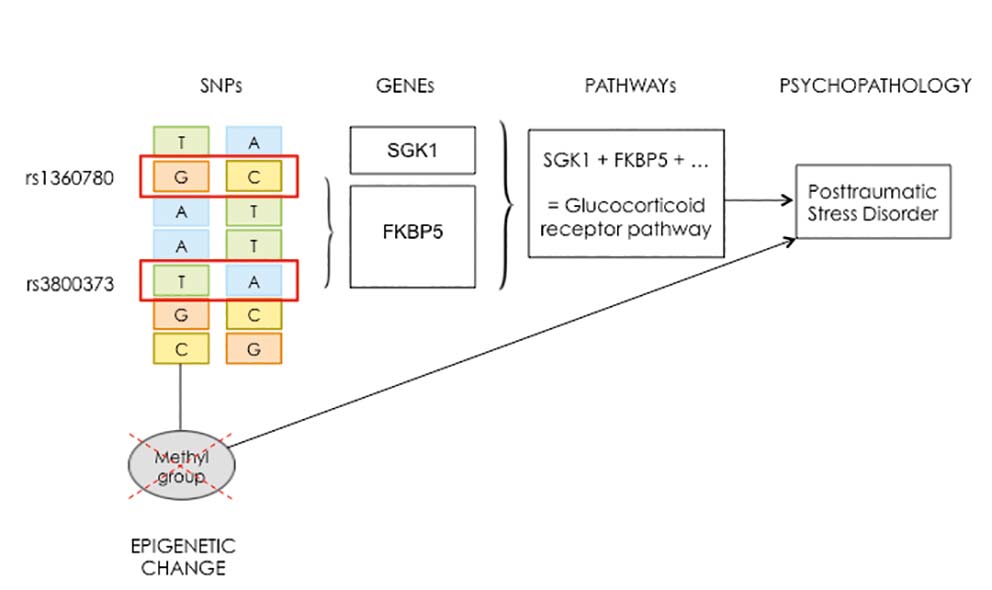Genetics and Epigenetics of Posttraumatic Stress Disorder and its Treatment
Daniela Conrad – Hector Fellow Thomas Elbert
The risk to develop posttraumatic stress disorder (PTSD) depends on the number of traumatic events experienced and individual risk factors, e.g. genetic predispositions. However, to identify causal genetic variants of this polygenic disease, trauma exposure needs to be adequately assessed. Furthermore, previously used candidate gene and genome-wide studies rarely presented with sufficient statistical power to detect the marginal effects of single genetic markers, making a combination with other more suited approaches necessary. Moreover, prior research indicated epigenetic modifications (i.e. biological mechanism influencing gene regulation and expression) to be risk factors for PTSD and potential predictors of treatment success.
This doctoral project, supervised by Hector Fellow Thomas Elbert, aims to systematically investigate the interplay between trauma exposure, genetic pathways and their epigenetic modification in terms of PTSD development in a large sample of survivors of the rebel war between the Lord‘s Resistance Army and Ugandan governmental troops. Further, the impact of genetic markers on PTSD treatment success using a trauma-focused therapy approach (Narrative Exposure Therapy, NET) is investigated.
A better understanding of genetic and epigenetic risk and resiliency factors in the etiology and treatment of PTSD will contribute in the long run to improved psychotherapeutic and pharmacological treatments for PTSD.
Publication:
Daniela Conrad, Sarah Wilker, Anett Pfeiffer, Birke Lingenfelder, Tracie Ebalu, Hartmut Lanzinger, Thomas Elbert, Iris-Tatjana Kolassa & Stephan Kolassa (2017). Does trauma event type matter in the assessment of traumatic load?, European Journal of Psychotraumatology, 8:1, 1344079. DOI: 10.1080/20008198.2017.1344079
http://www.tandfonline.com/doi/full/10.1080/20008198.2017.1344079
Gerke, J.*, Koenig, A. M.*, Conrad, D., Doyen-Waldecker, C., Pauly, M., Gündel, H., ... & Kolassa, I. T. (2018). Childhood maltreatment as risk factor for lifetime depression: The role of different types of experiences and sensitive periods. Mental Health & Prevention, 10, 56–65. doi:10.1016/j.mhp.2018.03.002
*These authors contributed equally to the manuscript.
Conrad, D., Wilker, S., Schneider, A., Karabatsiakis, A., Pfeiffer, A., Lingenfelder, B., Freytag, V., Vukojevic, V., Vogler, C., Milnik, A., Papassotiropoulos, A., de Quervain, D., Elbert, T., Kolassa, I.-T. (2018). Integrated genetic, epigenetic and gene set enrichment analyses identify NOTCH as a novel mediator for PTSD risk after trauma: Results from two independent African cohorts. Psychophysiology, 2018, e13288. Online publication ahead of print. doi:10.1111/psyp.13288
Conrad, D.*, Schneider, A.*, Pfeiffer, A., Wilker, S., Elbert, T., Kolassa, I.-T. (2018). Stigmatization Is associated with increased PTSD risk after traumatic stress and diminished likelihood of spontaneous remission – A study with East-African conflict survivors. Frontiers in Psychiatry, 9, 423. doi:10.3389/fpsyt.2018.00423.
*The authors contributed equally to this paper.

Schematic overview of main research topics of the doctoral project
Daniela Conrad
Universität KonstanzStress & Epigenetics
How fishes contribute to the treatment of post-traumatic stress disorder
An interdisciplinary research project by Prof. Dr. Axel Meyer & Prof. Dr. Thomas Elbert
Supervised by

Thomas Elbert
Psychology
